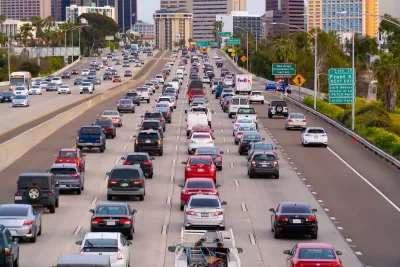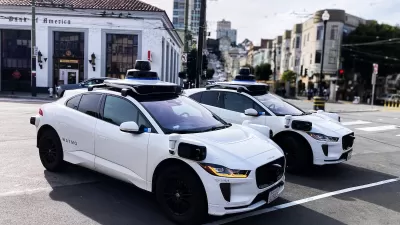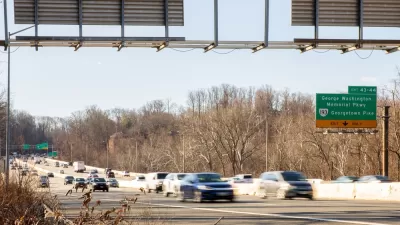The argument that car-centric development is good because it boosts national GDP ignores the massive costs of driving to everyday Americans.

In an opinion piece in Streetsblog USA, Andy Boenau argues that the link between more driving and higher GDP isn’t necessarily a good thing.
According to Boenau, the argument that GDP rises with VMT is “used in lazy attempts to prove road expansions for motor vehicles are necessarily good while traffic calming, road diets, bike lanes, transit lanes, etc. are bad. I do think the VMT/GDP overlay is an interesting talking point, but not in the way it’s generally spun by my fellow keyboard warriors.”
Boenau acknowledges that cars have greatly expanded our reach and opened up access to jobs and economic opportunities. In fact, if you take a simplistic perspective, sprawl is ‘good’ for GDP because it drives spending on roads, cars, fuel, and other related expenses. “VMT rises out of necessity, not as a marker of genuine growth or wealth.”
However, “GDP doesn't tell the dirty details of the car-dependent lifestyle most of America is burdened with.”
You might look at our soaring VMT trend as a reflection of disastrous land use and housing regulations rather than a direct sign of progress.
Boenau points to the high cost of car crashes for the U.S. healthcare system. According to the National Highway Traffic Safety Administration (NHTSA), motor vehicle crashes cost Americans roughly $340 billion in 2019 — costs that count as part of our GDP but are by no measure a positive thing for Americans. Beyond VMT and GDP, Boenau urges the reader to “Look at sedentary lifestyles, physical activity, heart disease, obesity, chronic illness, depression, anxiety. Look at the costs of each family having to be a fleet operator.”
FULL STORY: Opinion: Yes, the GDP Rises When We Drive More. But That Isn’t A Good Thing.

Alabama: Trump Terminates Settlements for Black Communities Harmed By Raw Sewage
Trump deemed the landmark civil rights agreement “illegal DEI and environmental justice policy.”

Planetizen Federal Action Tracker
A weekly monitor of how Trump’s orders and actions are impacting planners and planning in America.

The 120 Year Old Tiny Home Villages That Sheltered San Francisco’s Earthquake Refugees
More than a century ago, San Francisco mobilized to house thousands of residents displaced by the 1906 earthquake. Could their strategy offer a model for the present?

Rural Missouri Transit Service Could Lose State Funding
OATS Transit offers low-cost rides to primarily elderly rural residents with little or no access to other transportation options.

Opinion: California’s SB 79 Would Improve Housing Affordability and Transit Access
A proposed bill would legalize transit-oriented development statewide.

Record Temperatures Prompt Push for Environmental Justice Bills
Nevada legislators are proposing laws that would mandate heat mitigation measures to protect residents from the impacts of extreme heat.
Urban Design for Planners 1: Software Tools
This six-course series explores essential urban design concepts using open source software and equips planners with the tools they need to participate fully in the urban design process.
Planning for Universal Design
Learn the tools for implementing Universal Design in planning regulations.
Clanton & Associates, Inc.
Jessamine County Fiscal Court
Institute for Housing and Urban Development Studies (IHS)
City of Grandview
Harvard GSD Executive Education
Toledo-Lucas County Plan Commissions
Salt Lake City
NYU Wagner Graduate School of Public Service





























